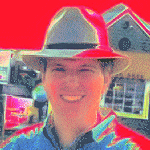Real Programmers
The story of Mel
Source: usenet: utastro!nather, May 21, 1983.
A recent article devoted to the *macho* side of programming made the bald and unvarnished statement:
Real Programmers write in Fortran.
Maybe they do now, in this decadent era of Lite beer, hand calculators and "user-friendly" software but back in the Good Old Days, when the term "software" sounded funny and Real Computers were made out of drums and vacuum tubes, Real Programmers wrote in machine code. Not Fortran. Not RATFOR. Not, even, assembly language. Machine Code.Raw, unadorned, inscrutable hexadecimal numbers. Directly.
Lest a whole new generation of programmers grow up in ignorance of this glorious past, I feel duty-bound to describe, as best I can through the generation gap, how a Real Programmer wrote code. I'll call him Mel, because that was his name.
I first met Mel when I went to work for Royal McBee Computer Corp., a now-defunct subsidiary of the typewriter company. The firm manufactured the LGP-30, a small, cheap (by the standards of the day) drum-memory computer, and had just started to manufacture the RPC-4000, a much-improved, bigger, better, faster -- drum-memory computer. Cores cost too much, and weren't here to stay, anyway. (That's why you haven't heard of the company, or the computer.)
I had been hired to write a Fortran compiler for this new marvel and Mel was my guide to its wonders. Mel didn't approve of compilers.
"If a program can't rewrite its own code," he asked, "what good is it?"
Read on ...




2 Comments:
Oh please. "Real" programmers code with a solder iron. But only after mining their own raw materials, refining the metals, etching their own circuit boards and producing their own semi-conductors. Some less manly programmers contract out for their semiconductors, or heaven forbid use ICs.
Great story, BTW. I'm in that awkward in between generation of programmers who have coded in mainframe Assembler, FORTRAN and COBOL in college but are luckily enough to have avoided it in the real world. I can appreciate the challenges faced by programmers back in the "good ole days".
My first machine was a drum machine with a paper tape reader like Mel in 1962. I found it limited and unsatisfying. In 1976, I hand soldered two Healthkit PDP-11 systems chip by chip in a medical research center. Everything was in Fortran which has a terrible syntax. I booted up a Ratfor compiler and wrote code so that nurses could take tablets on rounds to gather research study data and sync with the PDP-11 at the end of the day. 30 years later I'm in the mobile computing business trying to get more physicians and nurses to do the same thing with tools written in C/C++ and Java.
Post a Comment
<< Home